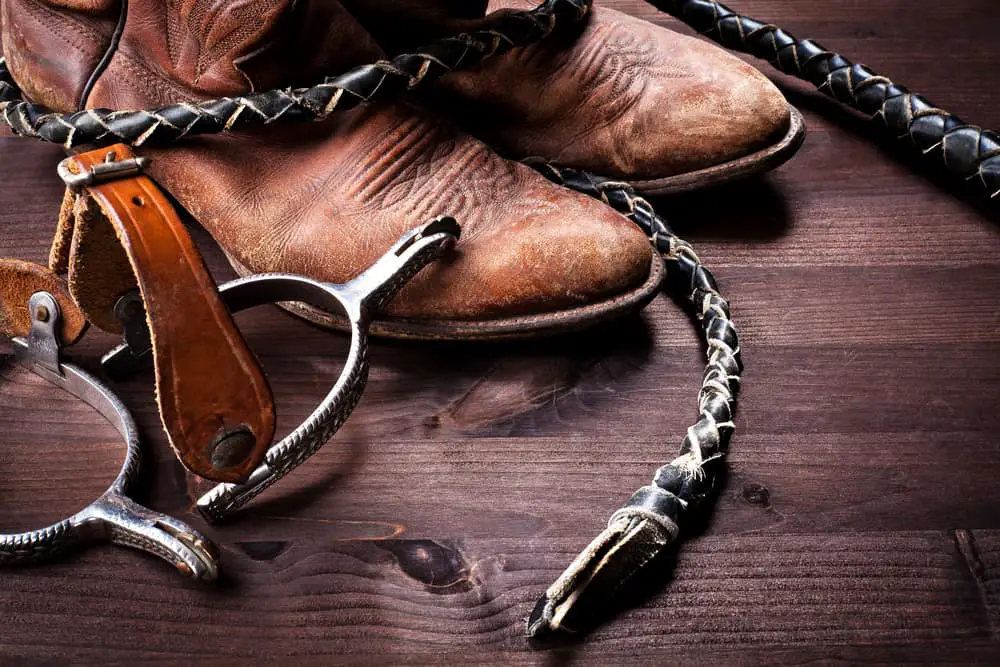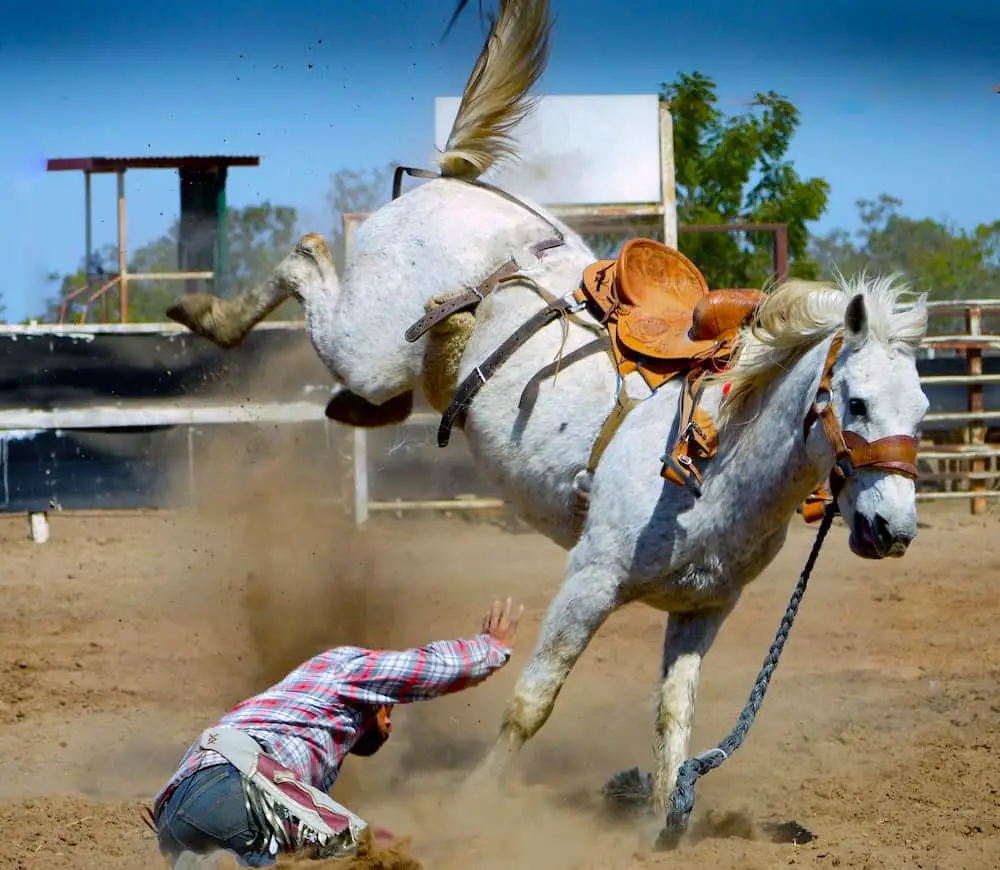Barrel racing is one of the most popular rodeo sports in the USA. This speed-based event pushes riders and their horses to their physical limits – but is it pushing them too hard? Is this pastime cruel to the animals we love?
Barrel racing isn't inherently cruel as long as it is performed with a professionally trained rider and a willing horse. The most common demonstration of abuse in this sport is when riders are under-trained and overuse whips and spurs. They can also train their horses to the point that the sport causes mental and physical damage.
People have been riding horses for centuries – whether it’s for work, travel, sport, or even in war.
At one point, all horses did run wild, but around 3500BC came one of the single most important discoveries – the ability for man and horse to work together.
We developed a mutually beneficial relationship where horses would get food and shelter, and people received a far more advanced form of transport in return.
But that doesn’t mean we haven’t taken advantage of the situation and exploited these gorgeous animals. Not all forms of horse riding are cruelty-free.
Is Barrel Racing a Cruel Sport?
Barrel racing is not crueler than any other equestrian sport like racing or the triathlete.
It all comes down to:
Human influence in barrel racing is the primary reason for any significant potential for cruelty.
Here are the main points of debate around barrel racing and how they attribute to its cruelty.
Untrained Racers Can be Unknowingly Cruel to Horses
The level of cruelty seen in barrel racing is often a domino effect that stems from poorly trained racers.
Since this is a speed-based sport, the horse is pushed to its absolute limits to finish the track formation as quickly as possible.
Racers have to goad their horses to run at top speed while maintaining their balance to not inhibit the horse’s performance or, worse, fall off.
If the racer doesn’t know the correct maneuvering techniques, they will likely hurt their horse by relying too heavily on riding tools, such as spurs and whips.
When inexperienced racers choose to compete with a reluctant horse, it’s more likely to be spooked by the crowds and won’t run its fastest, which will only trigger the racer to use whips and spurs excessively.
Racers Rely Heavily on Tools That Hurt the Horses
Possibly the most powerful argument for the cruelty of barrel racing is the use of riding tools to encourage horses to run faster, namely whips and spurs.
Depending on the type of whip and spur used for the sport, these pieces of equipment have the potential to harm a performance horse severely.
Horses might seem powerful and indestructible while racing, but they can be easily bruised and injured by either of these tools.
An under-trained racer should not have access to whips or spurs when learning to be a competitive barrel racer.
These pieces of equipment require their own element of training to prevent injury. Racers need to focus on proper horse riding and maneuvering before implementing them into their race technique.
For the most part, horses trained to barrel race are excited to compete and don’t need any incentive from spurs or whips to go as fast as they can.
Amateur racers are also far more likely to use harsh bits and over-rely on their reigns to the point that they are injuring the horse in their attempts to maneuver and maintain balance.
If these pieces of equipment are used too early in the training process, racers are likely to over-use them to the extent that they significantly increase the odds of injuring their horse out of frustration or misplaced encouragement.
Typically, a well-trained racer will learn how to compete without these tools. And for many, using these tools at all can be considered abusive.
Racers Force Horses to Overtrain and Compete Beyond Their Limits
One of the cruelest factors of barrel racing is when horses are trained and compete far beyond their mental and physical limitations.
If done so extensively enough, horses are completely worn out or even crippled by the end of their career.
Conversely, some barrel racing horses compete even though they are entirely under-conditioned and do not have the proper training and stamina to support them throughout the race.
This does not happen with every horse competing in barrel racing, and frankly, training an animal to the extreme can be seen in a wide range of sports, but it is still a factor to consider here.
Disaster is bound to occur when an exhausted horse is ridden by a human desperate to compete who uses whips or spurs excessively. Unfortunately, this is happening increasingly in the sport.
This is why many people question if the sport is inherently cruel and whether it’s tarnishing the reputation of barrel racing and well-trained, decent riders.
Is Barrel Racing Ethical?
Barrel racing is not a fundamentally cruel sport. But in practice, it can become unethical if it’s not supervised and managed correctly.
The objective of barrel racing is for a horse and its rider to ride around three barrels set in a triangular formation as fast as possible.
They need to make tight circles around each barrel before returning to the alleyway or entrance.
The duo that creates this cloverleaf pattern in the shortest time wins the event.
The thing about barrel racing is that it requires high levels of agility, speed, and unique movement. Every competition is intense, and the horses feel pressure when competing.
But many experienced racers take excellent care of their horses. Here are some of the reasons competitive barrel racing is ethical.
Experienced Racers Know Not to Exploit Their Horses
As a barrel racer, you must ensure you have given your horse everything it needs to have a healthy, happy life and perform to the best of its ability.
A horse can then enjoy their job as they have all the tools to complete the task correctly.
Any good racer will never exploit their horses by:
A good racer will have a soft connection with their horse through the reins. Barrel racing focused predominantly on the inside rein to guide the horse and support the racer but should not be relied on.
A young horse may need such assistance, but eventually, it needs to balance and carry itself to ensure its safety.
Racers Have to Keep Their Horses in Optimal Condition
All performance horses need extra care and attention paid to their health and medical needs.
Not only is it essential to help them perform at optimal levels, but it also helps prevent injury or help them quickly recover when something does go wrong.
There are three ways ethical riders ensure their horses are always in good health. Not only for the horse's wellbeing but so that they can perform optimally too.
Many Barrel Racing Organizations Have Strict Animal Cruelty Rules
Most barrel racing committees, organizations, and clubs take animal welfare seriously.
It’s often stipulated in their terms and conditions that abuse of any kind is not tolerated. It will lead to either a fine or disqualification depending on the offense.
This applies to global organizations like the National Barrel Horse Association (NBHA) – which has a zero-tolerance policy for animal abuse – and smaller parties like Better Barrel Racers (BBR).
The BBR, for example, has an extensive animal cruelty policy that prohibits things like:Barrel Racing Controversies
There are many controversies about barrel racing, especially when it comes to how safe and ethical it is.
We’ll help you debunk some of the biggest questions right here, and we’ll start with an easy one:
Barrel racing is not only for girls. Anyone can be a barrel racer, but it is a female-dominated sport.
Now let’s address the big issues.
Barrel Racing is Bad for a Horse’s Physical Health
Yes, this is true. The high-impact nature of barrel racing can cause long-term injuries in horses, just like horses in other disciplines such as show jumping.
A research study was conducted using the medical records of 118 barrel-racing horses. In the study, the five most common musculoskeletal problems were:
Many riders even see their horses refusing to turn on the first barrel because they want to avoid the pain associated with right forelimb lameness.
Starfishing is Very Cruel
This statement is true. Starfishing is the swearword of the barrel racing industry, and it’s bound to spark a few fights.
Starfishing is a cruel technique that some racers use to make their horses go faster by repeatedly kicking your legs into the horse as hard as you can.
When the horse is at its peak speed, you spread your legs wide and lift your butt off the seat.
This practice is highly unethical – no matter what any barrel racer says. Not only is it painful to have someone kick you repeatedly, but it damages the horse's back and slows them down in the long term.
Horses Don’t Like Barrel Racing
This is not always true. Some horses do like barrel racing! If a racer knows what she is doing and good horsemanship is at the forefront, a horse can be guided into any discipline that suits its personality.
Although each horse's personality differs, those that actively compete in barrel racing and get riled up before a competition – behave like that naturally because they get excited.
Competitive horses are unlikely to be spooked into a crazed state by the racers. When you see them get hyped up, usually it’s because they want to get out there and run.
It’s unlikely you’ll find a performance horse that does not like to compete because they would make a point to lash out and protest when forced to do something they don’t like.
Barrel Racing is Dangerous
Yes, this is very true! Barrel racing isn’t a sport for the faint-hearted – whether you’re a racer or the horse.
It is seen as one of the most dangerous forms of competitive racing out there, and here’s why.
With such high stakes, the best riders will spend countless hours of training and research to ensure both parties are as healthy and as safe as possible for maximum results.
Final Thoughts
In the hands of inexperienced riders, barrel racing can most certainly be cruel, especially if the horses used are physically and mentally exhausted, under-trained, or subject to excessive force from whips and spurs.
The best way to prevent this is to ensure all riders are adequately trained before they can compete regardless of age.
These individuals should also learn the complex techniques of riding and maneuvering before using tools of encouragement to prevent over-using and injury.
Not to mention racers are required to provide comprehensive pre-emptive medical care and facilities for their horse wherever they go.
All performance horses need to be kept on a highly nutritious diet with the right supplements and supplies to stay in optimal shape.
Most racers are highly dedicated because they spend all their time, money, and energy on their horse. So it’s unlikely you’ll see unethical practices, especially not in bigger competitive leagues.
And as an additional measure, most organizations like the NBHA have strict guidelines and rules around animal cruelty that need to be adhered to during the competition.
If all riders are trained and treat their horses with respect and care, barrel racing is a fun, competitive, and ethical sport.


